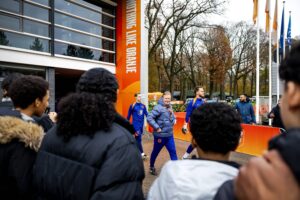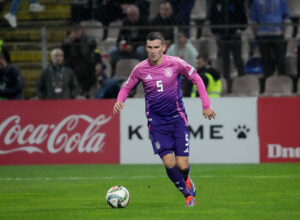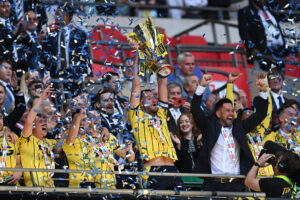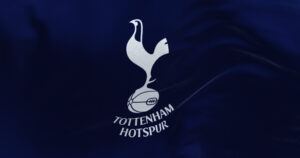In an era where the Black Cats have had their fair share of underachieving managers, it can be difficult to remember that they have times of great achievement. Famous FA Cup victories, promotions and have been crowned Champions of England on six occasions.
Here is a look back at some of the men that have led the Sunderland to great victories and gave fans memories that will never be forgotten.
For part one click here
Five of the Best Sunderland Managers of All Time: Part Two
Bob Stokoe
Bob Stokoe will forever be remembered for THAT FA Cup Final. However, he was so much more.
Like many managers down the years, Stokoe came to the club when they needed a kickstart. He was a local lad too, playing for rivals Newcastle United, and he understood fully what football meant to the area.
When Stokoe arrived at Roker Park during the first half of the 1972/73 season, the Black Cats were enduring a poor run of form and attendances were falling. He made things simple. Play football and enjoy yourself was his advice. It certainly worked. Attendances rose and during the next 32 games, only five defeats were endured. This spell also included a run to the FA Cup Final where Stokoe became a legend.
Cup Run Begins
With Sunderland’s form improving in the league, form which could have led to promotion if Stokoe had arrived earlier, attention turned to the FA Cup.
Unbeknownst to anyone at the time, but a run that would culminate in the greatest cup shock of all time was about to begin. Victories over lower league sides Notts County and Reading were expected but up next came a much tougher test in Manchester City.
City boasted the likes of Rodney March, Mike Summerbee and Francis Lee and at their home ground, they were expected to beat their Second Division opponents. The Black Cats earned a well-deserved draw to take City back to Roker Park for a replay. Sunderland were superb in that game, winning 3-1. It has since been voted the greatest game ever seen at Roker Park.
Luton Town were defeated in the quarter-final and in the semi, Sunderland faced Arsenal, a team who had won the League and Cup double in 1971 and were beaten finalists in 1972. The Gunners were favourites and rightly so. Stokoe and his team were not intimidated and ran out 2-1 winners to advance to their first final since 1937. The fans who packed into Hillsborough would not leave until Stokoe ‘The Messiah’ reappeared to take their applause and cheers.
The Mighty Leeds United Beaten
The final against the mighty Leeds United was, according to the majority, a foregone conclusion. Leeds would win and win well. Football doesn’t do scripts very well as we know and this one was well and truly ripped up.
Sunderland performed superbly and stopped Leeds playing their football. Ian Porterfield’s first-half volley was enough to sink Leeds, with the help of the greatest save made at the old Wembley of course, courtesy of Sunderland’s heroic goalkeeper Jim Montgomery.
Scenes that will live forever came at the final whistle as Stokoe ran across the pitch to embrace his keeper. The success in the cup final did and still does rank as arguably the greatest achievement by any Sunderland manager.
Stokoe would eventually get Sunderland promoted back to the top flight. They finished as champions in 1976 after two seasons of coming so close. This sadly would be his last great act at the club. Ill health meant he was unable to continue to the best of his abilities and he resigned in October 1976. Other managers may have won more than him but to achieve what he did with a team struggling for form and confidence when he took over in the old Second Division was remarkable.
A statue of the man they call the ‘Messiah’ stands outside of the club’s current home the Stadium of Light. For a man who was born a Newcastle United fan to have a statue built in his honour says it all about how much the fans of Sunderland adored him and still do.
Denis Smith
Denis Smith took over as manager in 1987 when the club was at its lowest. The club found themselves in England’s third tier for the first time ever. The job description was simple; doing it could prove more difficult. Get Sunderland promoted at the first attempt. Players who are now cult heroes at the club, such as John Kay and Marco Gabbiadini, were brought in to help the promotion push.
An average start to the season was turned around and the team ended up winning the Division Three (now known as League One) title at the first time of asking. Many supporters have said that this season was the most fun they had had whilst supporting the team. Not that they ever want to go back there.
Arch Rivals Defeated
After winning the title, Smith led the club back to the top tier of English football just three years after taking over. The play-off semi-final victory over rivals Newcastle United in 1990 is still talked about to this day. Even though the Black Cats were relegated in their first season back in Division One (now the Premier League), performances were generally good and the team outclassed many of their so-called bigger and better opponents. Sadly, good performances do not guarantee points.
The following season, with transfer funds limited, Smith decided to sell top scorer Marco Gabbiadini for a then-record £1.8 million to bring in new players. Soon after signing his new players, Smith, undeservedly, in the eyes of many supporters, was sacked. He will be remembered for saving the club when it was at its lowest and getting them back into the top flight in just three seasons. And of course THAT victory over Newcastle.
Peter Reid
Another manager who came to the club when they looked to be on the brink of relegation. Reid answered an SOS call in 1996 with seven games left. At the time all seemed lost and the club were heading to England’s third tier for the second time in their history. Reid, however, had different ideas and got to work on producing a miracle.
The first thing Reid did was to install a fighting spirit within the squad. Apart from a few players, this spirit was lacking and had been for some time. The Black Cats roared back into life and secured enough points to avoid relegation. The following season the unexpected happened. The club were initially quoted at 85-1 to win the Championship and rightly so; however, they defied all the odds and actually won it. A fans song “Cheer up Peter Reid” even hit the charts.
Premier League and Wembley’s Greatest Game
Sunderland were back in the Premier League. With this season being the last at the famous Roker Park, everyone hoped it would be a successful one. Sadly, the team could not avoid relegation.
With the club now at a new state-of-the-art stadium, the club wanted and deserved to be back in the Premier League sooner rather than later. During the 1997/98 season, the team missed out on automatic promotion by just a single point. The play-off semi-finals saw an unforgettable home game against Sheffield United. Sunderland won and went on to play in one of the greatest games ever to be played at the old Wembley. Unfortunately, after a 4-4 draw, opponents Charlton Athletic won a penalty shootout.
Winning in Style
Reid, the team and their fans were devastated but bounced back. The next season they secured the Championship title with a huge 105 point haul from 46 games. Reid improved the squad and instead of battling relegation from the Premier League, the team held their own, finishing in 7th place twice in two seasons. The club were top of the table at one point and enjoyed some excellent victories including two away victories at rivals Newcastle United. Reid was hopefully building a squad that could begin to compete with the best in England.
Good things, unfortunately, come to an end. Sadly, at times, it is sooner rather than later. The team struggled the following season and finished just one place above the relegation zone. After several seasons of excellent football, this season was a bad one; however, it was hopeful that Reid could turn things around. After just nine games the following season the club sacked Reid. This marked an end of an era. The club had moved grounds, finished in its highest position for decades and seen some of the best football played for many years. The same season Reid left, the Black Cats were relegated.
Main Photo






